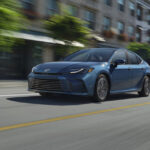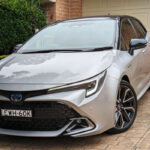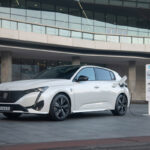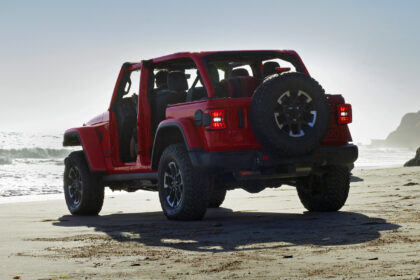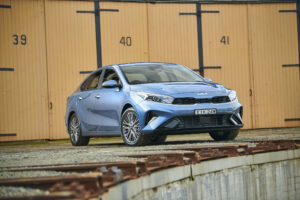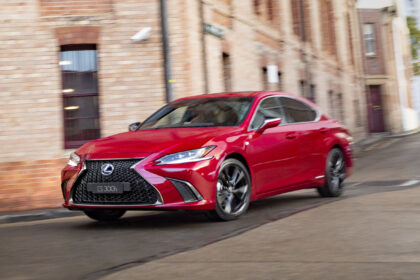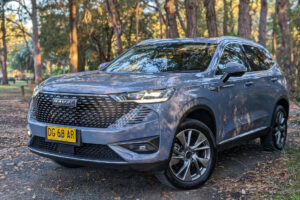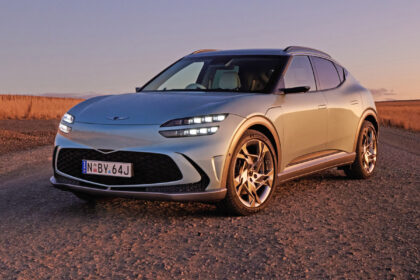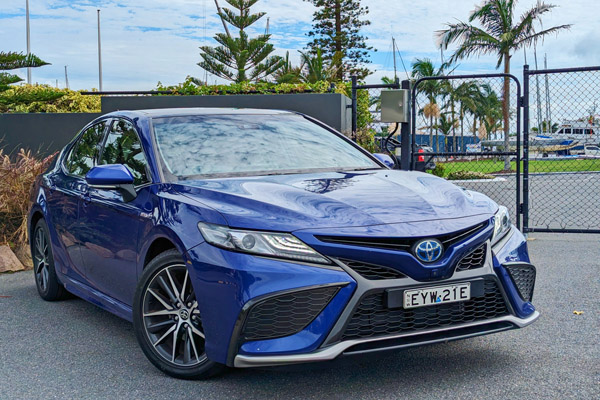
Before discussing the Camry Hybrid, it should be pointed out that you can’t actually
buy one right now.
With a two-year waiting list due to production delays, Toyota Australia has been
forced to “pause” orders for Camry hybrid variants due to extraordinary demand.
A new ninth generation Camry was unveiled in the United States in November, so it
will be interesting to see how Toyota plays this one.
At some point it will have to switch from production of the current model to the new
one.
Toyota reveals 90 per cent of Camry sales are now the hybrid.
This may result in a different specification and/or different price point at the time of
delivery.
STYLING
Sitting long and low, the current model was face-lifted in early 2021, at which point
the hybrid became an option for all four grades.
The face-lifted model features stronger front-end styling and enhanced safety
features, including Toyota Connected Services.
Externally, the entry-level Ascent has undergone an extensive transformation at the
front end with redesigned bumper and upper and lower grille that features distinctive
horizontal bars that offer a more refined aesthetic.
Ascent Sport, SX and SL grades received wide flared side fins and a lower spoiler
that stretches the width of the car, giving it a wide planted stance while the
honeycomb grille mesh adds to its sporty flair.
New design wheels ranging from 17- to 19-inch in size were also introduced, SX
featuring a black sports finish.
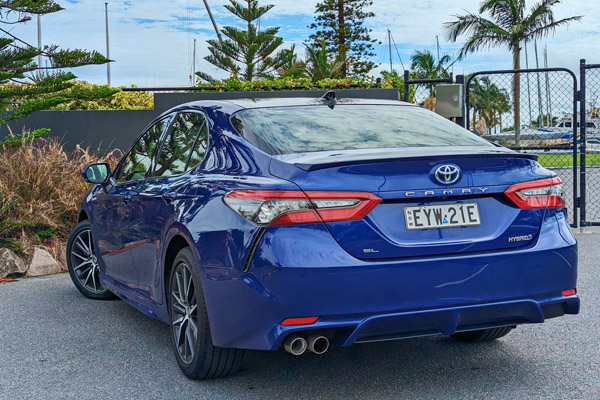
Prices for Camry kick off at $30,990 for the 2.5-litre petrol Ascent. The Ascent Hybrid
is $2500 more at $33,490. Ascent Sport Hybrid is $36,290, SX Hybrid is $39,190 and
SL Hybrid is $46,990 – all before on-road costs.
Eight bold colours are available, while premium paint adds $575.
Our test vehicle was the well-equipped, top of the line SX finished in blue mica
metallic, which at $46,990 represents excellent value for money.
Entry level Ascent comes with alloy wheels, cloth trim and manual air conditioning,
LED lights, with keyless smart entry and start plus two-zone climate control for hybrid
models.
Ascent Sport gains satellite navigation, while the sporty SX scores sports front seats,
19-inch alloys, sports suspension, paddle shifters and leather-accented trim.
SL features heated and cooled front seats, power adjustment for the driver and front
passenger seat, with memory and power lumbar adjustment for the driver, electric
boot opening, auto-dimming rear-view mirror and a panoramic sunroof.
There’s also adaptive cruise control, auto high beam, LED daytime lights, auto lights
and wipers, and front and rear parking sensors.
A redesigned centre console incorporates a larger standalone 9.0-inch touchscreen
that now sits higher above the air vents for easier access and better visibility.
SL adds head-up display which projects information on the lower area of the
windscreen.
Camry is covered by the five-year warranty, with capped-price servicing for the first
five years/75,000km with each 12-month/15,000km service costing $220.

INFOTAINMENT
All models feature the latest generation multimedia system with AM/FM and DAB+
radio, Bluetooth connectivity, Apple CarPlay (wireless) and Android Auto (wired)
compatibility and myToyota apps including Waze and Stitcher (IOS) and WebEx
(Android).
Ascent Sport adds satellite navigation with enhanced voice recognition with the SL
model delivering superb sound reproduction through a nine-speaker premium JBL
audio system.
Access to Toyota Connected Services is complimentary for three years.
There are two USB-C charge ports in the rear and a USB-A port in the front console
as well as a 12V/120W power accessory socket.
ENGINES / TRANSMISSIONS
The 160kW 2.5-litre hybrid powertrain is now offered across the range and accounts
for 90 per cent of sales.
The hybrid system employs a 2.5-litre four-cylinder Atkinson cycle petrol engine that
works in seamless combination with a pair of electric motor generators.
Torque is rated as 221Nm which is oddly slightly less than the figure provided for the
petrol engine on its own.
Petrol Ascent has a conventional eight-speed conventional auto, while the hybrid is
equipped with a CVT-style continuously variable automatic.
SAFETY
Camry receives a five-star safety rating but that rating which dates back to 2017 is
due to expire in December this year.
Dual frontal, side chest, side head-protecting (curtain) and driver knee airbags are
standard.
Autonomous emergency braking (AEB) with pedestrian and daylight cyclist detection
and a lane keep assist (LKA) system with lane departure warning (LDW), plus Blind
Spot Monitor with Rear Cross Traffic Alert are also standard.
The Toyota Safety Sense suite of safety systems has been enhanced with the
addition of road sign assist, emergency steering assist, lane trace assist and
intersection turn assist on every model.
Connected services can automatically call a 24/7 Toyota Emergency Call Centre and
relay the location of the vehicle in the event of a collision that requires intervention,
or if an airbag deploys.
The driver is also able to request emergency assistance via an SOS button on the
overhead console and if the vehicle is reported stolen.
It can assist authorities to help track the vehicle’s location via the Stolen Vehicle
Tracking (SVT) service.
DRIVING
The combination of the petrol engine and two motor generators delivers seamless,
linear power delivery through an electronic continuously variable transmission.
There are Eco, Normal and Sport modes, while manual sequential shifting is
provided via the shift lever or through paddle shifters on the premium SL and sports
SX models.
The hybrid system requires no user intervention.
It works just like a conventional car and does not require charging from a power
outlet compared with an EV or plug-in hybrid.
It is a self-charging system that draws power from the brakes, when the car is
travelling downhill or in stop-start city driving.
It’s a well-proven system that delivers significantly less fuel consumption.
With a 50-litre fuel tank, fuel use for the SL is a claimed 4.5L/100km and it takes
premium 95 unleaded, but is E10 compatible.
We were punching out a consistent 5.2L/100km on a 2100km return trip between
Sydney and Brisbane.
To put this in perspective the petrol model uses 6.8L/100km — which is also a very
good figure.
Interestingly, our SL rides on 18-inch wheels, while the sporty SX gets larger 19s.
This is because the ride is fairly firm to start with, so the 18-inch wheels are likely to
produce a plusher ride in the luxury model. You could always option it with 19s if this
is an issue.
Entry Ascent is the only grade that comes with a full-size spare wheel. The others
get a space saver (but more boot space as a result).
As has long been the case with Toyota hybrids, push the start button and nothing
appears to happen.
The petrol engine remains dormant but the dash comes to life indicating the system
is ready.
The engine kicks in once speed exceeds 20km/h, even when EV mode is evoked.
The system switches automatically between hybrid and electric mode as driving
conditions demand.
Scrolling through the driver information display shows the direction of energy. That is
when the electric motor and/or the petrol engine is operating, and when power is
being fed to the front wheels and battery.
Out on the highway Camry hybrid is almost silent, with the dash showing an EV
symbol occasionally as it seamlessly cuts in and out, supporting or being charged by
the petrol engine.
Most of the background noise comes from the 235/45 profile Bridgestone Turanza
tyres, which says something about the refinement of the hybrid package.
Alas you can’t get a V6 anymore and to be frank we miss the punch of a six, but
you’re not buying the Hybrid for its performance — you’re buying it for economy.
Sport mode helps . . . a little.
Camry is generally an easy relaxing car to drive, with light steering and surprisingly
little tug from the lane assist system, but plenty of annoying chimes.
It goes where you point it and stops, rather abruptly in fact if you hit the brakes too
firmly.
The ride can be harsh at times depending on the road surface, but it’s not a deal
breaker. Although if you frequent Sydney’s Parramatta Road you might think
otherwise.
Adaptive cruise control works well and generally retains the desired speed, but was
troubled by a series of small up-and-down hills. It accelerated to accommodate the
rise, but failed to adjust quickly enough on the descent, exceeding the set speed by
several kilometres per hour.
The SatNav can also be slow to respond.
The boot is large and deep with a 524-litre capacity in the hybrid.
SUMMING UP
The fact there is a two-year waiting list and that Toyota had been forced to cancel
further orders for Camry Hybrid speaks bucket loads.
Despite the demise of the Falcon and Commodore, it proves there’s still room for
traditional family sedans, and it shows this must be a good one.
We think so.
RATINGS:
Looks: 7.5
Performance: 7
Safety: 8
Thirst: 8
Practicality: 7.5
Comfort: 7.5
Tech: 7.5
Value: 8
Overall: 7.6
AT A GLANCE
MODEL RANGE
Camry Ascent: $34,320
Camry Ascent Hybrid: $36,820
Camry Ascent Sport Hybrid: $39,620
Camry SX Hybrid: $43,020
Camry SL Hybrid: $50,320
Note: These prices do not include government or dealer delivery charges. Contact
your local Toyota dealer for drive-away prices.
SPECIFICATIONS: (Toyota Camry SL 2.5-litre hybrid petrol-electric four-door sedan)
ENGINE:
Capacity: 2.5 litres
Configuration: Four cylinders in line with mild hybrid system
Maximum Power: 160 kW @ 5700 rpm
Maximum Torque: 221 Nm @ 3600-5200 rpm
Fuel Type: E10/95 premium unleaded
Combined Fuel Cycle (ADR 81/02): 4.5L/100km
CO2 Emissions: 103 g/km
DRIVELINE: Electronic Continuously Variable Transmission (e-CVT), front-wheel
drive
DIMENSIONS, WEIGHT AND CAPACITIES:
Length: 4904 mm
Wheelbase: 2825 mm
Width: 1840 mm
Height: 1445 mm
Turning Circle: 12.4 m
Kerb Mass: 1655 kg
Fuel Tank Capacity: 50 litres
BRAKES:
Front: Ventilated disc
Rear: Solid disc
Regenerative braking system
STANDARD WARRANTY:
Five years / unlimited kilometres




